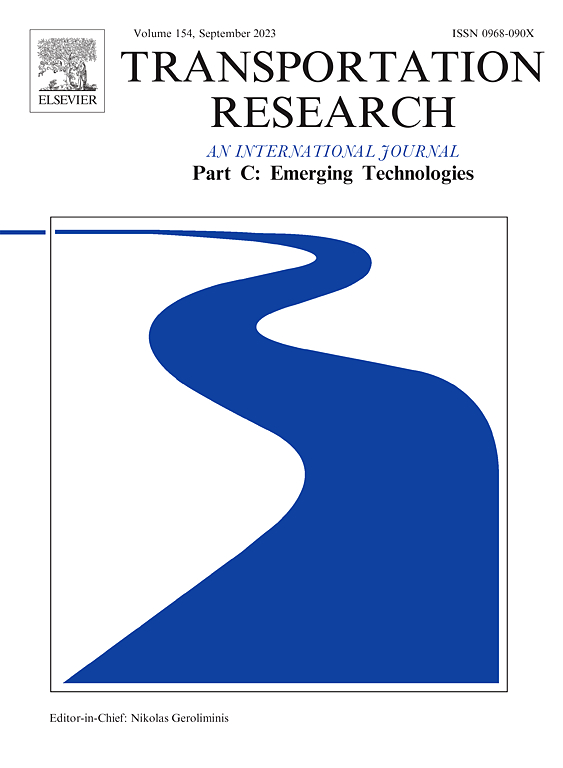考虑合理行动时间原则的基于冲突概率的UAS交通管理策略冲突解决
IF 7.6
1区 工程技术
Q1 TRANSPORTATION SCIENCE & TECHNOLOGY
Transportation Research Part C-Emerging Technologies
Pub Date : 2025-07-26
DOI:10.1016/j.trc.2025.105276
引用次数: 0
摘要
本文介绍了一种基于冲突概率估计的无人机系统交通管理(UTM)战略冲突解决方法。该方法讨论了两步冲突检测过程和三种冲突解决方法:先到先得(FCFS),合理行动时间(RTTA)和优化技术。冲突检测过程从粗筛选开始,粗筛选识别具有潜在冲突的交叉操作量(OV),然后进行精确的冲突概率估计。从安全角度出发,超过预定义概率阈值的交叉口被归类为冲突,其他交叉口被视为可接受。通过重新分配起飞时隙,冲突解决方法具有不同的优先级:FCFS方法坚持传统做法,RTTA概念优先考虑公平性,优化技术提高效率。在不同交通密度的三维空域环境下进行了数值实验。六个有代表性的案例研究通过两个线程,即效率和公平,彻底评估所提出的方法。结果表明,集成冲突概率可以显著降低延迟,并且可以通过优化技术进一步降低延迟。通过RTTA原则的实施,有效地解决了FCFS规则在飞行处理中继承的公平性问题。本文章由计算机程序翻译,如有差异,请以英文原文为准。
Conflict probability based strategic conflict resolution for UAS traffic management considering Reasonable-Time-To-Act principle
This paper introduces a strategic conflict resolution method for Unmanned Aircraft System Traffic Management (UTM) that incorporates conflict probability estimation. The method discusses a two-step conflict detection process and three conflict resolution approaches: First-Come First-Served (FCFS), Reasonable Time To Act (RTTA), and an optimisation technique. The conflict detection process begins with coarse screening, which identifies intersecting Operational Volumes (OV) with potential conflicts, followed by precise conflict probability estimation. Intersections exceeding the predefined probability threshold from safety perspective are classified as conflicts, while others are deemed acceptable. By reallocating take-off time slot, the conflict resolution approaches have different priorities: the FCFS method adheres to traditional practices, the RTTA concept prioritises fairness, and the optimisation technique enhances efficiency. Numerical experiments are conducted in three-dimensional airspace environment under varying traffic densities. Six representative case studies linked by two threads, i.e., efficiency and fairness, thoroughly assess the proposed methods. Results indicate that integrating conflict probability significantly reduces delays, and further reductions can be achieved through the optimisation technique. The fairness issue inherit in the FCFS rule for flight processing is effectively addressed through the implementation of the RTTA principle.
求助全文
通过发布文献求助,成功后即可免费获取论文全文。
去求助
来源期刊
CiteScore
15.80
自引率
12.00%
发文量
332
审稿时长
64 days
期刊介绍:
Transportation Research: Part C (TR_C) is dedicated to showcasing high-quality, scholarly research that delves into the development, applications, and implications of transportation systems and emerging technologies. Our focus lies not solely on individual technologies, but rather on their broader implications for the planning, design, operation, control, maintenance, and rehabilitation of transportation systems, services, and components. In essence, the intellectual core of the journal revolves around the transportation aspect rather than the technology itself. We actively encourage the integration of quantitative methods from diverse fields such as operations research, control systems, complex networks, computer science, and artificial intelligence. Join us in exploring the intersection of transportation systems and emerging technologies to drive innovation and progress in the field.

 求助内容:
求助内容: 应助结果提醒方式:
应助结果提醒方式:


